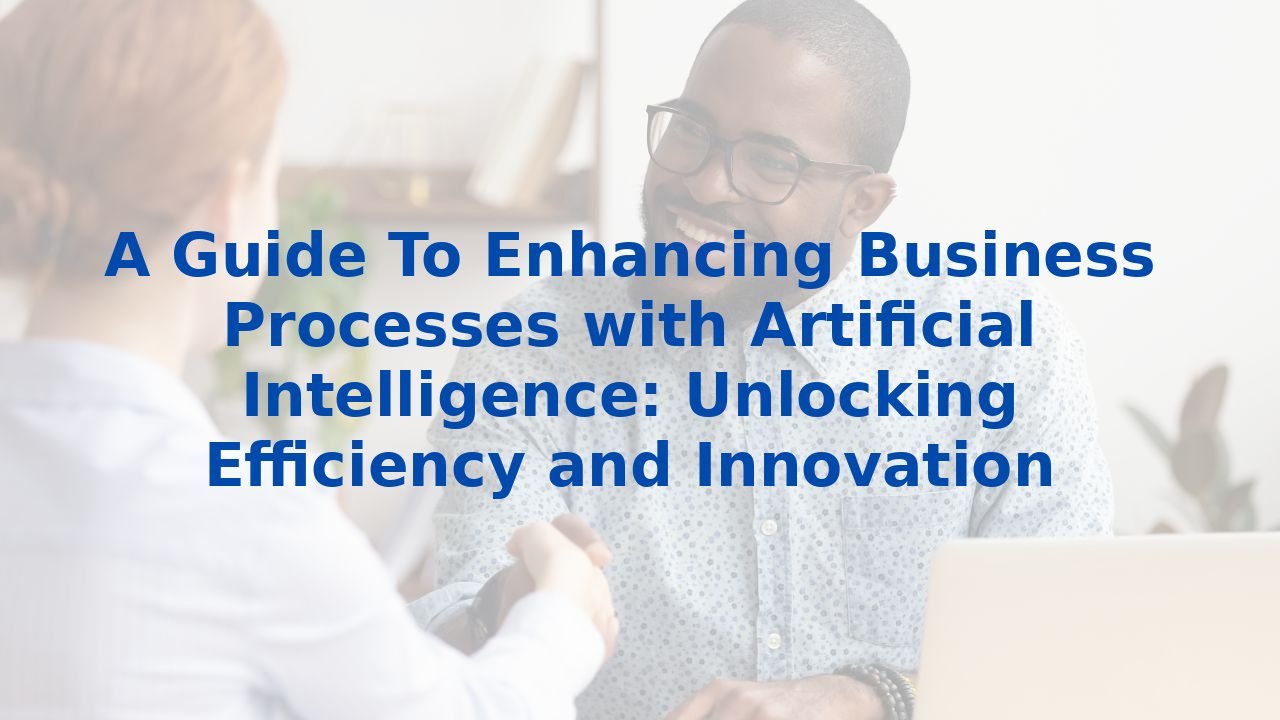A Guide To Enhancing Business Processes with Artificial Intelligence: Unlocking Efficiency and Innovation

A Guide To Enhancing Business Processes with Artificial Intelligence: Unlocking Efficiency and Innovation
In today's fast-paced business landscape, the pressure to improve efficiency and adapt to ever-shifting market needs is palpable. Organizations are continuously exploring effective strategies for streamlining operations, and one transformative tool stands out: Artificial Intelligence (AI). From automating tedious tasks to providing invaluable insights, AI has the potential to revolutionize various business processes. This guide will delve into how AI can enhance these processes and the paramount importance of equipping your workforce to leverage these technologies.
Transforming Business Meetings
Meetings, while essential, often descend into sessions bogged down by logistical challenges. Enter AI. By automating scheduling through voice assistants and capturing key highlights during discussions, AI can significantly streamline this process. Imagine an AI tool managing your calendar, ensuring that important meetings are well-organized while summarizing key points for future reference. This not only saves time but also guarantees that crucial information doesn’t slip through the cracks. The potential of AI in this realm can transform meetings from mundane obligations to productive, focused sessions.
Revolutionizing Sales and Marketing
Sales and marketing teams have much to gain from AI-driven analytics. With AI integrated into Customer Relationship Management (CRM) systems, businesses can now predict customer behaviors, identifying those most likely to engage and convert. This data-centric approach allows organizations to channel their resources effectively, ensuring that the right strategies are deployed for high-potential customers. Furthermore, the rise of chatbots in sales offers an unparalleled opportunity for immediate customer engagement, addressing concerns and driving conversions around the clock.
Enhancing Customer Service
Customer service can be a differentiating factor in competitive markets, and AI plays a pivotal role in elevating this experience. AI technologies can improve call monitoring, giving organizations the ability to assess service quality in real time. With AI’s accuracy surpassing traditional methods in identifying problematic interactions, businesses can ensure that customer experiences are continuously improving. This proactive approach to customer care not only enhances satisfaction but also fosters loyalty.
Streamlining Product Development
The product development lifecycle can be long and resource-consuming, but AI is changing that narrative. Generative design software, powered by AI, enables teams to explore a multitude of design possibilities based on specific parameters. This innovation avoids the costly pitfalls of traditional prototyping by producing viable designs rapidly. As a result, the time-to-market decreases, allowing organizations to respond to emerging trends and consumer needs with agility.
Automating Content Creation
In a world where content reigns supreme, AI has become a game-changer in the realm of content generation. Organizations can leverage AI tools to produce high-quality articles, product descriptions, and web copy swiftly. This capability not only accelerates the content creation process but also allows teams to dedicate their time to more strategic initiatives. The automation of mundane writing tasks empowers creatives to focus on sparking ideas and innovation rather than just production.
Improving Manufacturing Processes
Manufacturing has seen a seismic shift with the integration of AI technologies. Collaborative robots (cobots) are emerging as indispensable allies on the factory floor, minimizing human risk while optimally enhancing productivity. With AI the driving force behind these cobots, companies can create environments that promote efficiency while fostering a culture of safety. As these technologies become more accessible, even smaller organizations can compete effectively within their industries.
Refining Recruitment Practices
Recruitment is another area where AI’s impact is profound. By analyzing vast datasets, AI swiftly identifies ideal candidates, expediting the hiring process. Automated resume screening, personalized job descriptions, and matching potential hires to job requirements revolutionize traditional approaches, allowing HR teams to focus on cultivating talent rather than getting lost in paperwork.
The Crucial Role of Employee Training
While the benefits of AI in enhancing business processes are clear, the effectiveness of these technologies hinges on the employees who use them. Comprehensive training is essential for maximizing AI’s potential. Well-trained employees not only adapt to new tools but also enhance operational efficiency and drive innovation. By understanding how to integrate AI into their workflows, team members can focus on creativity and strategy rather than repetitive tasks.
For organizations looking to thrive in the age of AI, investing in Complete AI Training is paramount. By equipping your workforce with the skills necessary to navigate an AI-enhanced business landscape, you position your organization for sustainable success. The journey to efficient, innovative business processes starts here.
Conclusion
AI is not merely a trend; it’s a fundamental shift in how businesses operate. By leveraging AI technologies and committing to employee training, organizations can unlock immense value across various business processes. Embracing this change will not only improve operational efficiency but also cultivate a culture of innovation, allowing companies to thrive in an increasingly competitive world.